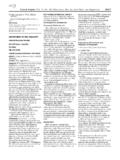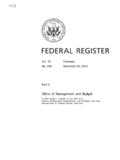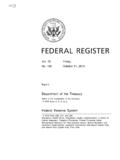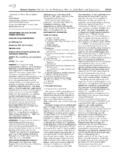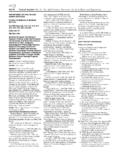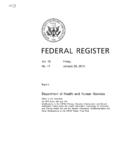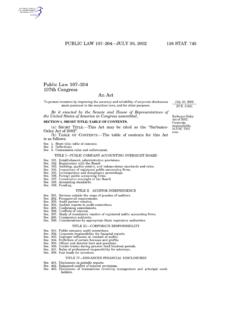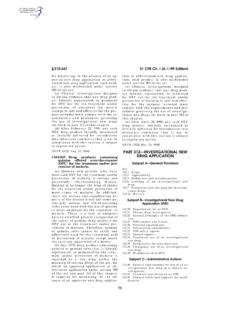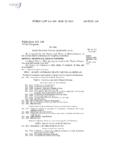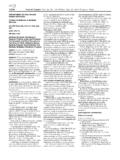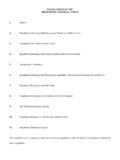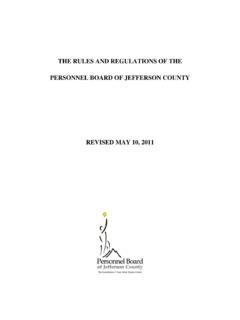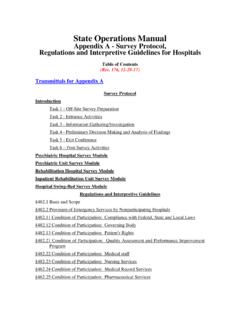Transcription of Department of Education - GPO
1 Vol. 76 Wednesday, No. 188 September 28, 2011 Part II Department of Education 34 CFR Parts 300 and 303 Early Intervention Program for Infants and Toddlers With Disabilities; Assistance to States for the Education of Children With Disabilities; Final Rule and Proposed Rule VerDate Mar<15>2010 18:30 Sep 27, 2011 Jkt 223001 PO 00000 Frm 00001 Fmt 4717 Sfmt 4717 E:\FR\FM\ 28 SER2srobinson on DSK4 SPTVN1 PROD with RULES260140 Federal Register/ Vol. 76, No. 188 / Wednesday, September 28, 2011 / Rules and regulations Department OF Education 34 CFR Part 303 RIN 1820 AB59 Early Intervention Program for Infants and Toddlers With Disabilities AGENCY: Office of Special Education and Rehabilitative Services, Department of Education . ACTION: Final regulations . SUMMARY: The Secretary issues final regulations governing the Early Intervention Program for Infants and Toddlers with Disabilities.
2 These regulations are needed to reflect changes made to the Individuals with Disabilities Education Act, as amended by the Individuals with Disabilities Education Improvement Act of 2004 (Act or IDEA). DATES: These regulations are effective on October 28, 2011. FOR FURTHER INFORMATION CONTACT: Alexa Posny, Department of Education , 550 12th Street, SW., Potomac Center Plaza, room 5107, Washington, DC 20202 2641. Telephone: (202) 245 7605. If you use a telecommunications device for the deaf (TDD), you may call the Federal Relay System (FRS) at 1 800 877 8339. Individuals with disabilities may obtain this document in an alternative format ( , braille, large print, audiotape, or computer diskette) upon request to the contact person listed under FOR FURTHER INFORMATION CONTACT. SUPPLEMENTARY INFORMATION: These regulations implement changes in the regulations governing the Early Intervention Program for Infants and Toddlers with Disabilities necessitated by the reauthorization of the IDEA.
3 On May 9, 2007, the Department of Education (the Department ) published a notice of proposed rulemaking in the Federal Register (72 FR 26456) (NPRM) to amend the regulations governing the Early Intervention Program for Infants and Toddlers with Disabilities. In the preamble to the NPRM, the Secretary discussed, on pages 26456 through 26496, the changes proposed to the regulations for this program, which regulations are set forth in 34 CFR part 303. In these regulations , the Department is amending and finalizing the regulations proposed in the May 2007 NPRM, except in the maintenance of effort (MOE) provisions (proposed ) (which implement part C s supplement not supplant requirements). The Department plans to obtain additional public input and conduct further rulemaking in this area. Due to the economic changes that many States have experienced since the publication of the NPRM in May 2007, the Department has received many informal inquiries requesting guidance on the MOE provisions in the part C regulations (which implement the supplement not supplant requirements under part C of the Act).
4 States also have expressed concern about their ability to meet the MOE requirements and their continued participation in the part C program. In response to these concerns, the Department intends to issue a separate NPRM and seek input from the public on the MOE provisions. Accordingly, these final regulations continue in the MOE requirements in current Major Changes in the regulations The following is a summary of the major changes in these final regulations from the regulations proposed in the NPRM (the rationale for each of these changes is discussed in the Analysis of Comments and Changes section of this preamble): Subpart A General Definitions The definition of multidisciplinary in has been revised with respect to the individualized family service plan (IFSP) Team composition to require the parent and two or more individuals from separate disciplines or professions with one of these individuals being the service coordinator.
5 Revised (a) and new (a)(5) and (a)(6) clarify that in the case of a child who is limited English proficient, native language means the language normally used by the parents of the child except that when conducting evaluations and assessments of the child, qualified personnel determine whether it is developmentally appropriate to use the language normally used by the child. Additionally, we have removed the requirement in proposed (a)(2) that the native language of the parents be used in all direct contact with the child. We have revised the definition of personally identifiable information in to cross-reference, with appropriate modifications, the definition of that same term contained in the regulations under the Family Educational Rights and Privacy Act (FERPA) in 34 CFR , as amended. New adds to these regulations a definition of scientifically based research, which cross-references, with appropriate modifications, the definition of the same term contained in section 9101(37) of the Elementary and Secondary Education Act of 1965, as amended (ESEA).
6 Subpart C State Application and Assurances Application Requirements Section (b)(2) clarifies that the State s application must include, as part of coordination of all resources, those methods the State uses to implement the payor of last resort requirements in Revised (b), regarding public participation policies and procedures, requires lead agencies to hold public hearings, provide at least 30 days prior notice for the hearings, and provide a public comment period of at least 30 days before adopting any new or revised part C policies or procedures. Revised (b)(1)(i) (proposed (b)(2)(i)) requires that, for toddlers with disabilities who may be eligible for preschool services under part B of the Act, the lead agency notify (consistent with any opt-out policy adopted by the State under (e)), not only the local educational agency (LEA) where the toddler resides, but also the State educational agency (SEA), and revise the timeline for the notification to occur not fewer than 90 days before the toddler s third birthday.
7 New (b)(1)(ii) clarifies that if the lead agency determines a child to be eligible for part C services between 45 and 90 days prior to the toddler s third birthday, the lead agency must notify (consistent with any opt-out policy adopted by the State under (e)), not only the LEA where the toddler resides, but also the SEA, as soon as possible after the toddler s eligibility determination. New (b)(1)(iii) provides that if a child is referred to the lead agency fewer than 45 days before that toddler s third birthday, the lead agency is not required to conduct the initial evaluation, assessment, or IFSP meeting, and if that child may be eligible for preschool services or other services under part B of the Act, the lead agency, with the parental consent required under , must refer the toddler to the SEA and appropriate LEA. Revised (d)(2) clarifies that the transition plan is not a separate document, but is included in the IFSP.
8 New (e) clarifies that a transition conference under (c) or meeting to develop the transition plan under (d) must meet the VerDate Mar<15>2010 18:30 Sep 27, 2011 Jkt 223001 PO 00000 Frm 00002 Fmt 4701 Sfmt 4700 E:\FR\FM\ 28 SER2srobinson on DSK4 SPTVN1 PROD with RULES260141 Federal Register/ Vol. 76, No. 188 / Wednesday, September 28, 2011 / Rules and regulations IFSP meeting requirements in (d) and (e) and (a) and that this conference and meeting may be combined. New (f) clarifies when and what transition requirements in apply to toddlers with disabilities, including toddlers in a State that elects to offer part C services beyond age three under Revised (b)(6) clarifies the transition requirements that apply to children receiving services under as they transition to preschool, kindergarten or elementary school. Proposed has been revised to include the MOE requirements in current The Department intends to issue an NPRM on the MOE provisions and provide an opportunity for the public to comment on the proposed rule.
9 Subpart D Child Find, Evaluations and Assessments, and Individualized Family Service Plans General New identifies the major components of the statewide comprehensive, coordinated, multidisciplinary interagency system by specifically distinguishing between pre- referral activities (public awareness and child find), referral, and post-referral IFSP activities (including screening, evaluations, assessments, and IFSP development, review, and implementation). Pre-Referral Procedures Revised (c) (proposed (c)) requires each lead agency, as part of its public awareness obligation, to provide for informing parents of toddlers about preschool programs under section 619 of the Act not fewer than 90 days prior to the toddler s third birthday. Revised new (c)(1)(ii) (proposed (c)(1)(ii)) adds the following two programs to the list of programs with which the lead agency must coordinate its child find efforts: (1) The Children s Health Insurance Program (CHIP) and (2) the State Early Hearing Detection and Intervention (EHDI) system.
10 Since the publication of the May 2007 NPRM, the name of the State Children s Health Insurance Program (S-Chip) was changed to the Children s Health Insurance Program (CHIP). This change is reflected in these final regulations . Revised (a)(2)(i) requires primary referral sources to refer a child to the part C program as soon as possible but in no case more than seven days after identification. Post-Referral Procedures New (proposed (e)(1)) requires that, within 45 days after the lead agency or early intervention service (EIS) provider receives a referral of a child, the screening (if applicable), initial evaluation, initial assessments (of the child and family), and the initial IFSP meeting for that child must be completed (45-day timeline). New (b)(2) adds an exception to the 45-day timeline if the parent has not provided consent to the initial screening, evaluation, or assessment of the child, despite documented, repeated attempts to obtain parental consent.
